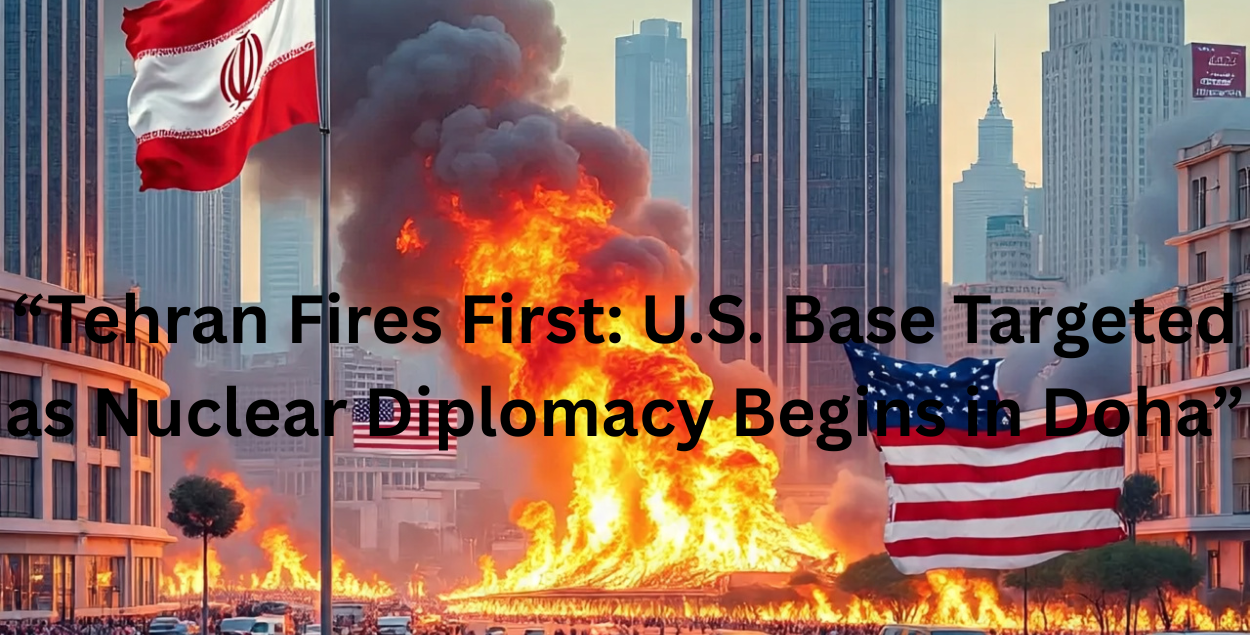FnF News
🇺🇸 FNF News | Gulf Crisis & Global Diplomacy
Published: June 27, 2025
By: Khadija Khan, Chief Global Affairs Correspondent – FNF
Tehran Targets U.S. Base in Qatar as Nuclear Talks Open in Doha
In a bold and calculated move, Iran launched 19 ballistic missiles at the U.S.-controlled Al‑Udeid Air Base in Qatar late Monday night. The strike occurred just hours before U.S. and Iranian negotiators gathered in Doha to begin critical talks aimed at preventing a regional war and reining in Iran’s nuclear ambitions. Dubbed “Operation Glad Tidings of Victory” by Tehran, the attack was meant as both retaliation and leverage—though no lives were lost.
According to U.S. Central Command, 18 missiles were successfully intercepted by a layered missile defense system involving Patriot, THAAD, NASAMS, Rapier, and Roland batteries. One missile landed outside the base perimeter without causing damage or casualties. General Dan Caine, Chairman of the Joint Chiefs, described the defense as “the largest Patriot engagement in Gulf history,” crediting a team of just 44 U.S. soldiers with stopping what could have been a devastating assault.
The Ceasefire That Wasn’t
The strike followed a short-lived ceasefire announced by President Trump just days earlier, brokered through Qatari and Saudi channels. That ceasefire is now effectively dead. Israeli airstrikes resumed in Syria, and Iran responded with cyberattacks, drones, and this missile barrage.
U.S. intelligence now believes Iranian proxy forces—particularly Hezbollah in Lebanon and Kata’ib Hezbollah in Iraq—are preparing for a second phase of escalation if diplomacy fails. Houthis in Yemen are also reportedly on alert.
Doha Talks Begin Under Tension
Despite the missile strike, U.S. and Iranian diplomats sat down in Doha as scheduled. Talks are focused on restoring IAEA access to Iranian nuclear sites, enforcing a cap on uranium enrichment below 60%, and exploring sanctions relief tied to Iran’s frozen oil revenue. Iran’s Parliament, however, recently passed a law suspending cooperation with the IAEA unless sanctions are lifted—a red flag for Western negotiators.
Officials from the EU and Russia are attending the meetings as observers. China has declined formal involvement, signaling its preference to remain diplomatically neutral.
Gulf Shuts Its Sky
The missile attack sent immediate shockwaves across the Gulf. Qatar closed its airspace within minutes of receiving warning and worked with the U.S. to protect key infrastructure. Civil aviation was severely disrupted. Qatar Airways diverted over 90 flights, and more than 20,000 passengers were impacted.
Neighboring states, including Bahrain, Kuwait, and the UAE, also shut down portions of their airspace in coordination. Qatar’s Prime Minister described relations with Iran as “scarred but not broken,” and reaffirmed the nation’s commitment to diplomacy over retaliation.
U.S. Forces Prepare for Escalation
The Pentagon has quietly repositioned Carrier Strike Groups Ford, Nimitz, and Carl Vinson across the Arabian Gulf and the Red Sea. The Department of Defense has also activated heightened cyber defense protocols following a series of Iranian-linked hacking attempts targeting Gulf infrastructure and U.S. military systems.
CENTCOM has not ruled out a retaliatory strike but said current policy is to allow diplomacy a chance—unless Iran resumes uranium enrichment above the agreed limit or blocks inspectors from accessing facilities like Fordow or Natanz.
Markets Respond with Caution
Despite the dramatic strike, global oil markets remained relatively calm. Brent crude dropped by nearly 7%, reflecting market confidence in Gulf air defenses and expectations that war is not imminent. Still, analysts warn the situation is volatile.
If diplomacy collapses, oil could surge past $100/barrel within hours. Defense contractors such as Raytheon and Lockheed Martin saw immediate gains on news of the successful Patriot operation.
Khamenei’s Message: Strike First, Then Negotiate
Iran’s Supreme Leader Ayatollah Ali Khamenei praised the strike in a rare public address, calling it “a calculated correction to the balance of power.” Iranian diplomats claim the strike was proportional and intentionally non-lethal, adding that Tehran seeks “dignified dialogue, not war.”
This dual approach—projecting power before negotiation—has become a cornerstone of Iran’s strategy. It allows Tehran to assert regional credibility while preserving channels for diplomacy.
America Watches and Waits
President Trump called the strike “weak but expected,” praising the U.S. troops who defended Al‑Udeid. Privately, however, senior officials have begun drawing contingency plans. If Iran refuses to cooperate with the IAEA or if enrichment continues above weapons-grade thresholds, further U.S. airstrikes may be authorized.
The White House has reiterated its message: diplomacy is preferred, but pressure will remain. A senior official summed it up clearly:
“Tehran doesn’t get to fire missiles at our bases and then pretend nothing happened at the table.”

